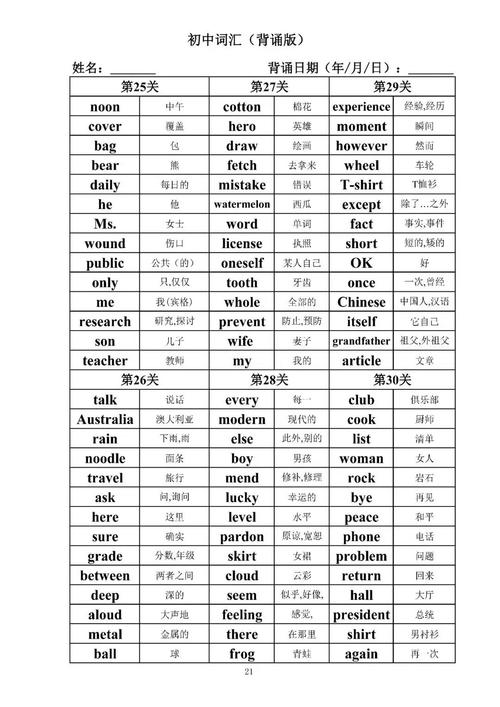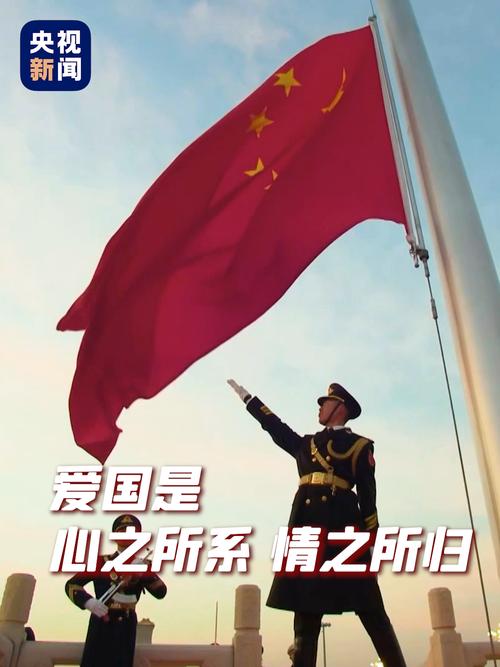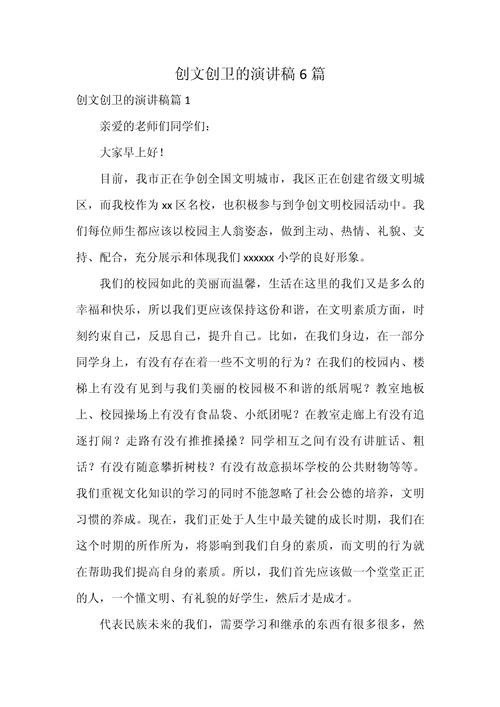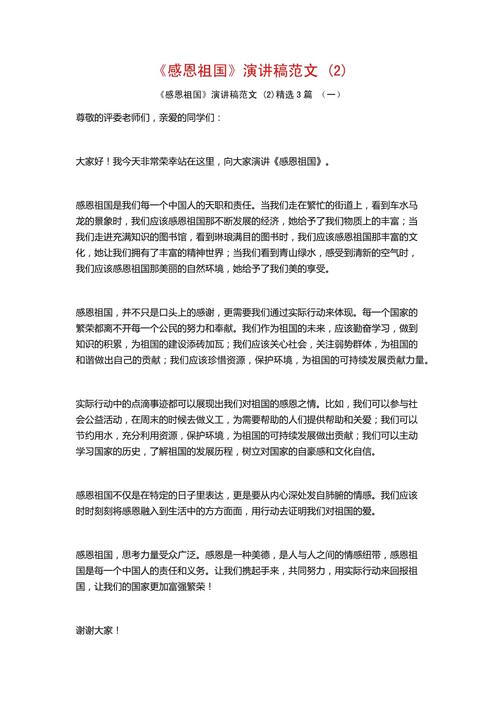
英语经典演讲稿范文(通用6篇)
英语经典演讲稿范文 篇1
Let’s stand up from where we fall down
All the celebrations welcoming the new century were hold in the year 20xx, because life without a greeting is like the sky without the sun.Greetings are very important for the whole world,in my opinion.
But I don't know whether greetings are enough for us.Especially when we meet with failures .I remember quite clearly that when I was a child,if I fall down and was on the brink of crying,my father always told me"Please stand up from where you fall down!"
Yes,we must stand up from where we fall down.
That was a special mid night in 1993.Expectations filled our hearts.
We stared at the TV,hoping excitedly as the voice would fly to our ears.
But at last,each Chinese who loves our motherland was distressed to know the result:Beijing ,lost to Sydeny by a margin of two votes in the Olym
Eight years have past,but the frustration has not healed with time at all.
Now,at the begining of the new millennium,all of the pride and disappointment of the 20th century had gone with the wind. The 21st century,which is full of hope,longing znd thought has come. Someone said,we would start from zero on.
Should I really start from zero on?
No!I hold that we should go on with our efferts and ambitions stayed by last century,and make our life better.
"New Beijing,Great Olympics!" The voice cries this out around China's captital,a 3,000 -year-old city these days.
Beijing,along with Paris,Istanbul,Osake and Toronto,has been shortlisted by the International Olympic Committee as an official candidate city for the 20xx Olympic Games.
英语经典演讲稿范文 篇2
honorable judges, distinguished guests, ladies and gentlemen:
it is a great honor and pleasure to be here on this beautiful saturday morning to share with you my sentiments about life and passion for the english language.
about a year and a half ago, i took part in my very first english speech contest. when i stood before the microphone with all eyes starring directly at me, i could hardly speak. i stood there, embarrassed and helpless, struggling in vain for the right thing to say. my fears had paralyzed me.
while my passion for english has never changed, i lost my courage to speak in public. when my professor again encouraged me to take part in this competition, i said “no.” i couldn’t endure yet another painful experience. he looked me straight in the eye and said something that pierced my heart. i will never forget his words. “look,” he said, “we all have our fears, and you have yours. you could twist your ankle in a basketball game, but then be afraid to ever play again. running away can never dispel your fears, but action will. a winner is not one who never fails,but one who never quits.”
i spent a whole day with his words twisting and turning in my mind. then i made the bravest and wisest decision of my life: i would face my fears – and take part in the competition!
as it turned out, my dear old professor was right. now, here i am, once again standing before a microphone. my heart is beating fast, and my mouth is dry, but most importantly, i have faced my fears -- and that makes all the difference!
thank you.
英语经典演讲稿范文 篇3
Welcome to Guangdong
ladies and gentlemen, honorable judges, good afternoon.
i come from one of the most lovely and attractive areas of china, the pearl river delta of guangdong province and i'd love to say a few words about this area that is so dear to my heart.
guangdong province is a magically beautiful wonderland, with endless natural treasures. the lush and green mountains are inhabited by songbirds and exotic animals; the farm land is fertile and productive, providing all of its people with wonderfully nutritious grains and all the fruits they need to be healthy and strong. the pearl river meanders through the province and eventually comes to our beautiful seashore with crystal clear blue water, flourishing with all kinds of different fish and sea creatures. all these natural advantages help to boost the ever-expanding economy of guangdong and increase the welfare of its people.
guangdong is privileged to have such a beautiful landscape, with hundreds of historical sites and places of great interest to local people and foreigners alike. our capital city, guangzhou, is also known as "the city of flowers". everywhere you look you will see flourishing plants and blossoming flowers overflowing with vigor.
the people of guagdong are very friendly to visitors from anywhere. whoever you are and wherever you come from, guangdong people will greet you with the only language---guangdong dialect.
guangdong is also known as the chinese capital of delicious food. there is an old saying that "the only best delicacies are in guangdong.” food from this province is internationally famous. its variety of tastes, shapes and colors can satisfy even the most refined palette. i'm sure, the moment you seat yourself at a cantonese banquet, your appetite will naturally become keen and eager to taste all the numerous delicacies of the region. here are but a few i will mention in passing: steamed fish in ginger sauce, seasoned chicken, drunken shrimp, dance fish balls, fried jellyfish, roast suckling pig or duck, braised crispy chicken or squab, shark fin soup, moon cakes, refreshments and desert, and so many more. my mouth is watering just at the sound of these wonderful dishes.
i would like you all to know that there is truly nowhere in the world i would rather live and i invite you all to come discover the hidden treasures of my hometown. i would be glad to serve as your personal guide.
thank you all.
英语经典演讲稿范文 篇4
Developing a good learning habit
the most powerful strength in the world is a habit. the most precious fortune is also a habit. it’s true to an enterprise, a country and a nation. so is it to human life. habit is one of your belongings. if you have a good habit, you will never use it up. however, if you have a bad habit, you will be in endless debt. whether to be an owner or a slave is up to you. your behavior leads to a habit, your habit develops your personality, and your personality determines your destiny. from this, we can see it is important for middle school students to build up a good learning habit.
as middle school students, what habits do we have to develop?
1. show your respect and appreciation to your teachers.
2. preview your lessons well.
3. listen to the teacher carefully.
students should concentrate on in class, and grasp the importance and difficulties, so that they will have the class effectively.
4. observe attentively and think actively.
5. be good at asking questions. the best students are those who are willing to ask questions and those who are creative.
6. learn from others.
everyone has his own advantages and disadvantages. what we should do is to learn from each other and get improved.
7. do your homework independently.
homework is an important part of teaching activities and it is a continuous part. it is the basic and independent practice. at the same time, it is the way to test how much students learned.
some students don’t have a clear purpose and attitude towards it. they cheat in different ways. some students are afraid of doing something difficult. these bad habits influenced the efficiency of learning. so, we should pay much attention to our homework.
8. think over when you take a test.
9. reflect after doing exercise.
10. learn to summarize.
at last, make a list of your mistakes.
mistral , one of the winners of nobel prize in chile, said,“we may wait for lots of things we need, but students can’t do that. they are growing up. we shouldn’t say tomorrow to them. their names are today.
thus, let’s start from today, from now on, from every little thing and cultivate one good habit and another. let all the good habits be with us for a life time, be a ladder that leads us to success, and to a splendid tomorrow.
英语经典演讲稿范文 篇5
Mr. President, Mr. Speaker, members of the 77th Congress,
I address you, the members of this new Congress, at a moment unprecedented in the history of the union. I use the word “unprecedented” because at no previous time has American security been as seriously threatened from without as it is today.
Since the permanent formation of our government under the Constitution in 1789, most of the periods of crisis in our history have related to our domestic affairs. And, fortunately, only one of these -- the four-year war between the States -- ever threatened our national unity. Today, thank God, 130,000,000 Americans in 48 States have forgotten points of the compass in our national unity.
It is true that prior to 1914 the United States often has been disturbed by events in other continents. We have even engaged in two wars with European nations and in a number of undeclared wars in the West Indies, in the Mediterranean and in the Pacific, for the maintenance of American rights and for the principles of peaceful commerce. But in no case had a serious threat been raised against our national safety or our continued independence.
What I seek to convey is the historic truth that the United States as a nation has at all times maintained opposition -- clear, definite opposition -- to any attempt to lock us in behind an ancient Chinese wall while the procession of civilization went past. Today, thinking of our children and of their children, we oppose enforced isolation for ourselves or for any other part of the Americas.
That determination of ours, extending over all these years, was proved, for example, in the early days during the quarter century of wars following the French Revolution. While the Napoleonic struggles did threaten interests of the United States because of the French foothold in the West Indies and in Louisiana, and while we engaged in the War of 1812 to vindicate our right to peaceful trade, it is nevertheless clear that neither France nor Great Britain nor any other nation was aiming at domination of the whole world.
And in like fashion, from 1815 to 1914 -- ninety-nine years -- no single war in Europe or in Asia constituted a real threat against our future or against the future of any other American nation.
Except in the Maximilian interlude in Mexico, no foreign power sought to establish itself in this hemisphere. And the strength of the British fleet in the Atlantic has been a friendly strength; it is still a friendly strength.
Even when the World War broke out in 1914, it seemed to contain only small threat of danger to our own American future. But as time went on, as we remember, the American people began to visualize what the downfall of democratic nations might mean to our own democracy.
We need not overemphasize imperfections in the peace of Versailles. We need not harp on failure of the democracies to deal with problems of world reconstruction. We should remember that the peace of 1919 was far less unjust than the kind of pacification which began even before Munich, and which is being carried on under the new order of tyranny that seeks to spread over every continent today. The American people have unalterably set their faces against that tyranny.
I suppose that every realist knows that the democratic way of life is at this moment being directly assailed in every part of the world -- assailed either by arms or by secret spreading of poisonous propaganda by those who seek to destroy unity and promote discord in nations that are still at peace. During 16 long months this assault has blotted out the whole pattern of democratic life in an appalling number of independent nations, great and small. And the assailants are still on the march, threatening other nations, great and small.
Therefore, as your President, performing my constitutional duty to "give to the Congress information of the state of the union," I find it unhappily necessary to report that the future and the safety of our country and of our democracy are overwhelmingly involved in events far beyond our borders.
Armed defense of democratic existence is now being gallantly waged in four continents. If that defense fails, all the population and all the resources of Europe and Asia, and Africa and Austral-Asia will be dominated by conquerors. And let us remember that the total of those populations in those four continents, the total of those populations and their resources greatly exceed the sum total of the population and the resources of the whole of the Western Hemisphere -- yes, many times over.
In times like these it is immature -- and, incidentally, untrue -- for anybody to brag that an unprepared America, single-handed and with one hand tied behind its back, can hold off the whole world.
No realistic American can expect from a dictator’s peace international generosity, or return of true independence, or world disarmament, or freedom of expression, or freedom of religion -- or even good business. Such a peace would bring no security for us or for our neighbors. Those who would give up essential liberty to purchase a little temporary safety deserve neither liberty nor safety.
As a nation we may take pride in the fact that we are soft-hearted; but we cannot afford to be soft-headed. We must always be wary of those who with sounding brass and a tinkling cymbal preach the "ism" of appeasement. We must especially beware of that small group of selfish men who would clip the wings of the American eagle in order to feather their own nests.
I have recently pointed out how quickly the tempo of modern warfare could bring into our very midst the physical attack which we must eventually expect if the dictator nations win this war.
There is much loose talk of our immunity from immediate and direct invasion from across the seas. Obviously, as long as the British Navy retains its power, no such danger exists. Even if there were no British Navy, it is not probable that any enemy would be stupid enough to attack us by landing troops in the United States from across thousands of miles of ocean, until it had acquired strategic bases from which to operate.
But we learn much from the lessons of the past years in Europe -- particularly the lesson of Norway, whose essential seaports were captured by treachery and surprise built up over a series of years. The first phase of the invasion of this hemisphere would not be the landing of regular troops. The necessary strategic points would be occupied by secret agents and by their dupes -- and great numbers of them are already here and in Latin America. As long as the aggressor nations maintain the offensive they, not we, will choose the time and the place and the method of their attack.
And that is why the future of all the American Republics is today in serious danger. That is why this annual message to the Congress is unique in our history. That is why every member of the executive branch of the government and every member of the Congress face great responsibility, great accountability. The need of the moment is that our actions and our policy should be devoted primarily -- almost exclusively -- to meeting this foreign peril. For all our domestic problems are now a part of the great emergency.
Just as our national policy in internal affairs has been based upon a decent respect for the rights and the dignity of all our fellow men within our gates, so our national policy in foreign affairs has been based on a decent respect for the rights and the dignity of all nations, large and small. And the justice of morality must and will win in the end.
Our national policy is this:
First, by an impressive expression of the public will and without regard to partisanship, we are committed to all-inclusive national defense.
Secondly, by an impressive expression of the public will and without regard to partisanship, we are committed to full support of all those resolute people everywhere who are resisting aggression and are thereby keeping war away from our hemisphere. By this support we express our determination that the democratic cause shall prevail, and we strengthen the defense and the security of our own nation.
Third, by an impressive expression of the public will and without regard to partisanship, we are committed to the proposition that principles of morality and considerations for our own security will never permit us to acquiesce in a peace dictated by aggressors and sponsored by appeasers. We know that enduring peace cannot be bought at the cost of other peoples freedom.
In the recent national election there was no substantial difference between the two great parties in respect to that national policy. No issue was fought out on this line before the American electorate. And today it is abundantly evident that American citizens everywhere are demanding and supporting speedy and complete action in recognition of obvious danger.
Therefore, the immediate need is a swift and driving increase in our armament production. Leaders of industry and labor have responded to our summons. Goals of speed have been set. In some cases these goals are being reached ahead of time. In some cases we are on schedule; in other cases there are slight but not serious delays. And in some cases -- and, I am sorry to say, very important cases -- we are all concerned by the slowness of the accomplishment of our plans.
The Army and Navy, however, have made substantial progress during the past year. Actual experience is improving and speeding up our methods of production with every passing day. And todays best is not good enough for tomorrow.
I am not satisfied with the progress thus far made. The men in charge of the program represent the best in training, in ability, and in patriotism. They are not satisfied with the progress thus far made. None of us will be satisfied until the job is done.
No matter whether the original goal was set too high or too low, our objective is quicker and better results.
To give you two illustrations:
We are behind schedule in turning out finished airplanes. We are working day and night to solve the innumerable problems and to catch up.
We are ahead of schedule in building warships, but we are working to get even further ahead of that schedule.
To change a whole nation from a basis of peacetime production of implements of peace to a basis of wartime production of implements of war is no small task. And the greatest difficulty comes at the beginning of the program, when new tools, new plant facilities, new assembly lines, new shipways must first be constructed before the actual material begins to flow steadily and speedily from them.
The Congress of course, must rightly keep itself informed at all times of the progress of the program. However, there is certain information, as the Congress itself will readily recognize, which, in the interests of our own security and those of the nations that we are supporting, must of needs be kept in confidence.
New circumstances are constantly begetting new needs for our safety. I shall ask this Congress for greatly increased new appropriations and authorizations to carry on what we have begun.
I also ask this Congress for authority and for funds sufficient to manufacture additional munitions and war supplies of many kinds, to be turned over to those nations which are now in actual war with aggressor nations. Our most useful and immediate role is to act as an arsenal for them as well as for ourselves. They do not need manpower, but they do need billions of dollars’ worth of the weapons of defense.
The time is near when they will not be able to pay for them all in ready cash. We cannot, and we will not, tell them that they must surrender merely because of present inability to pay for the weapons which we know they must have.
I do not recommend that we make them a loan of dollars with which to pay for these weapons -- a loan to be repaid in dollars. I recommend that we make it possible for those nations to continue to obtain war materials in the United States, fitting their orders into our own program. And nearly all of their material would, if the time ever came, be useful in our own defense.
Taking counsel of expert military and naval authorities, considering what is best for our own security, we are free to decide how much should be kept here and how much should be sent abroad to our friends who, by their determined and heroic resistance, are giving us time in which to make ready our own defense.
For what we send abroad we shall be repaid, repaid within a reasonable time following the close of hostilities, repaid in similar materials, or at our option in other goods of many kinds which they can produce and which we need.
Let us say to the democracies: "We Americans are vitally concerned in your defense of freedom. We are putting forth our energies, our resources, and our organizing powers to give you the strength to regain and maintain a free world. We shall send you in ever-increasing numbers, ships, planes, tanks, guns. That is our purpose and our pledge."
In fulfillment of this purpose we will not be intimidated by the threats of dictators that they will regard as a breach of international law or as an act of war our aid to the democracies which dare to resist their aggression. Such aid -- Such aid is not an act of war, even if a dictator should unilaterally proclaim it so to be.
And when the dictators -- if the dictators -- are ready to make war upon us, they will not wait for an act of war on our part.
They did not wait for Norway or Belgium or the Netherlands to commit an act of war. Their only interest is in a new one-way international law, which lacks mutuality in its observance and therefore becomes an instrument of oppression. The happiness of future generations of Americans may well depend on how effective and how immediate we can make our aid felt. No one can tell the exact character of the emergency situations that we may be called upon to meet. The nations hands must not be tied when the nations life is in danger.
Yes, and we must prepare, all of us prepare, to make the sacrifices that the emergency -- almost as serious as war itself -- demands. Whatever stands in the way of speed and efficiency in defense, in defense preparations of any kind, must give way to the national need.
A free nation has the right to expect full cooperation from all groups. A free nation has the right to look to the leaders of business, of labor, and of agriculture to take the lead in stimulating effort, not among other groups but within their own group.
The best way of dealing with the few slackers or trouble-makers in our midst is, first, to shame them by patriotic example, and if that fails, to use the sovereignty of government to save government.
As men do not live by bread alone, they do not fight by armaments alone. Those who man our defenses and those behind them who build our defenses must have the stamina and the courage which come from unshakable belief in the manner of life which they are defending. The mighty action that we are calling for cannot be based on a disregard of all the things worth fighting for.
The nation takes great satisfaction and much strength from the things which have been done to make its people conscious of their individual stake in the preservation of democratic life in America. Those things have toughened the fiber of our people, have renewed their faith and strengthened their devotion to the institutions we make ready to protect.
Certainly this is no time for any of us to stop thinking about the social and economic problems which are the root cause of the social revolution which is today a supreme factor in the world. For there is nothing mysterious about the foundations of a healthy and strong democracy.
The basic things expected by our people of their political and economic systems are simple. They are:
Equality of opportunity for youth and for others.
Jobs for those who can work.
Security for those who need it.
The ending of special privilege for the few.
The preservation of civil liberties for all.
The enjoyment -- The enjoyment of the fruits of scientific progress in a wider and constantly rising standard of living.
These are the simple, the basic things that must never be lost sight of in the turmoil and unbelievable complexity of our modern world. The inner and abiding strength of our economic and political systems is dependent upon the degree to which they fulfill these expectations.
Many subjects connected with our social economy call for immediate improvement. As examples:
We should bring more citizens under the coverage of old-age pensions and unemployment insurance.
We should widen the opportunities for adequate medical care.
We should plan a better system by which persons deserving or needing gainful employment may obtain it.
I have called for personal sacrifice, and I am assured of the willingness of almost all Americans to respond to that call. A part of the sacrifice means the payment of more money in taxes. In my budget message I will recommend that a greater portion of this great defense program be paid for from taxation than we are paying for today. No person should try, or be allowed to get rich out of the program, and the principle of tax payments in accordance with ability to pay should be constantly before our eyes to guide our legislation.
If the Congress maintains these principles the voters, putting patriotism ahead pocketbooks, will give you their applause.
In the future days, which we seek to make secure, we look forward to a world founded upon four essential human freedoms.
The first is freedom of speech and expression -- everywhere in the world.
The second is freedom of every person to worship God in his own way -- everywhere in the world.
The third is freedom from want, which, translated into world terms, means economic understandings which will secure to every nation a healthy peacetime life for its inhabitants -- everywhere in the world.
The fourth is freedom from fear, which, translated into world terms, means a world-wide reduction of armaments to such a point and in such a thorough fashion that no nation will be in a position to commit an act of physical aggression against any neighbor -- anywhere in the world.
That is no vision of a distant millennium. It is a definite basis for a kind of world attainable in our own time and generation. That kind of world is the very antithesis of the so-called “new order” of tyranny which the dictators seek to create with the crash of a bomb.
To that new order we oppose the greater conception -- the moral order. A good society is able to face schemes of world domination and foreign revolutions alike without fear.
Since the beginning of our American history we have been engaged in change, in a perpetual, peaceful revolution, a revolution which goes on steadily, quietly, adjusting itself to changing conditions without the concentration camp or the quicklime in the ditch. The world order which we seek is the cooperation of free countries, working together in a friendly, civilized society.
This nation has placed its destiny in the hands and heads and hearts of its millions of free men and women, and its faith in freedom under the guidance of God. Freedom means the supremacy of human rights everywhere. Our support goes to those who struggle to gain those rights and keep them. Our strength is our unity of purpose.
To that high concept there can be no end save victory.
英语经典演讲稿范文 篇6
Goodaftrnoon, ladies and gentlemen:
My topic today is “The Internet Will Become More Popular.”
The Internet, which was unfamiliar to human beings is totally accepted by most of people. Especially these days, it has been developing faster and faster, people do not have much time to do everything by themselves. So full use of the Internet is a good way to color one’s life.
For instance, students could learn more and morefromall over the world so that they can broaden their horizon and enrich their knowledge. Absolutely, the bridge that connects the whole world is the Internet.
Secondly, scientists and mathematicians, too, can share research results in order to promote the wheel of human society much more quickly.
I suppose the key factor of importance of Internet is to find a good job . In the society which is full of competition, more information means more opportunities. A job hunter can get on the Internet to browse for a favorable job.
Well,fromwhat has been mentioned above, I believe with the high speed and efficiency, the Internet will become more and more popular among people in the near future.
Thank you very much!
上一篇:经典英语演讲稿优秀范文
下一篇:返回列表






